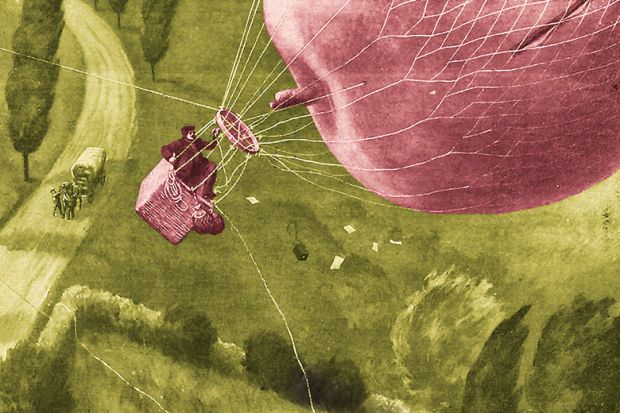‘By its very nature, the academy silences loss and grief, just as it does other emotional expressions’
Waking in darkness, I crawl to the sofa where I first learned, by phone, that my father had died. It is 4am – the time when, I’m told, we can most easily connect with those on their way to the afterlife. Wrapped in a blanket to keep out Vienna’s autumn chill, I close my eyes and slowly and quietly sing to him.
I wonder if Dad can hear my sob-filled melodies from the other side of the world. Can he sense me beckoning him to leave his resting place in Australia and return to me once more? It is nearing 5am when I feel it – a gust of wind that whips through the apartment and slams the bedroom door shut. I dare not open my eyes. I’m not afraid that his spirit has arrived but rather that this is a figment of my imagination.
In the early days of my grief, I thought very little about my PhD. It was enough to climb out of bed each day, eat a little and not dive too far into a wine bottle. One day blended into another until, at some point, I decided to speak to others about my grief. I am not sure what I was seeking in telling people about Dad’s death, but I felt there was something especially important about sharing it with those who were academics. Perhaps I thought other scholars would understand me best.
Breaking my silence occurred impulsively. During an email exchange with a researcher in my field who I knew well, I casually added, “By the way, my Dad died but I’m doing OK.” In her reply, she omitted to mention Dad’s death and I realised she had only read the start of the email – a sign of a time-strapped academic with a flooded inbox.
Not long after, an academic I befriended at a conference took me on a tour of her town. As she invited me into a church to admire its interior, I suddenly decided to light a candle for Dad and felt compelled to tell her of his passing. Her response was direct and devoid of emotion. She warned me that I would struggle to complete my PhD. “All-consuming,” she said. “You sleep under your desk. No time for anything else.”
It only took these two experiences for me to bottle up my grief. From then on, I did not share Dad’s death with anyone in academia, not even my supervisors. It would be years before I would speak about it again. I have since wondered why I silenced myself when I needed support the most. Impostor syndrome is one possible reason. I already doubted my abilities and the thought that those deep in grief might struggle to complete their PhD intensified these concerns, encouraging me to conceal my situation until after my conferral.
Yet I also think that, by its very nature, the academy silences loss and grief, just as it does other emotional expressions. As much as a third of the student body may be grieving at any one time, a situation described as a silent epidemic. Yet the offering of bereavement leave remains sporadic, recent studies show, signifying how we are expected to just soldier on.
While there is a need to expand the availability of bereavement leave for students, it is not a blanket solution. Universities need to offer a supportive environment for when grieving students return from their absence, as well as for those who choose not to take time off. Putting grieving students in contact with one another is also of great benefit, as the US-based Actively Moving Forward programme demonstrates.
Eventually, I wrote an autoethnography on grieving while writing a PhD, published last year in the journal Higher Education Research & Development. Since then, dozens of students have expressed to me their difficulties in finding academics to listen to, and discuss, personal experiences of grief. While accessing counselling can help, students often want to reach out to academics they know well, too. Yet many scholars are not trained in how to best respond to such disclosures. They frequently lack knowledge of diverse grieving styles, the various ways bereft students process such difficult circumstances. Knee-jerk and imprudent responses are sometimes the result, pushing grieving students further into isolation.
Systemic issues are also at play. The contemporary university environment, with its publication, teaching and administrative pressures, gives staff precious little time to develop these skills or provide the care needed – a situation that must change if we truly believe in reducing student attrition rates.
While a wider discussion is clearly needed, we can begin by carving out spaces within the academy where grieving students can safely break their silence. After all, what they most need is often just an ear, some heart, and a reminder that they are not alone.
Alexandra Ridgway is a socio-legal scholar who completed her PhD through the department of sociology at The University of Hong Kong, graduating in 2020.

‘I was barely holding everything together, but I was grateful to have work’
After 10 years in senior academic administration in Australia, I found my dream job on the other side of the world, establishing a new, stand-alone engineering school called TEDI-London.
My son and daughter-in-law lived in London at the time, but my husband decided to stay at home, in Wollongong. We had been married for 44 years and he was self-sufficient, surrounded by his books and various ongoing projects. He had followed me around the world several times, but this time said “I’m not going to the phlegm-producing capital of the world”. We had it all worked out, though – I would come home twice a year and he would come and visit twice a year, stopping each time in San Francisco to visit our eldest son.
So off I went at the beginning of 2019, oblivious of what was to come – Brexit, Covid and, worst of all, my husband’s illness and, ultimately, his passing.
Robert was diagnosed with stage-four colon cancer two months after I got settled in London. His prognosis was not good: between one and four years, depending on how he responded to treatment. The natural thing would have been to give up and go home, but Robert wouldn’t hear of it. He said he couldn’t look at himself in the mirror if I did that. I, on the other hand, knew that I would feel guilty whatever decision I made. I desperately wanted to see the job through, but also wanted to be with him.
After much discussion and numerous family Zoom calls, many of which ended by Robert threatening to hang up because we were trying to tell him what to do, we decided he would begin treatment on his own. I attended all of his doctors’ appointments by Zoom. Things went reasonably well – chemo and radiation were difficult, but he was able to tolerate them and I managed to get home for visits three times during 2019.
Towards the end of the year, he was still well enough to travel, so we had a lovely trip to Italy and spent Christmas in London with the whole family, including being there for the birth of our first granddaughter. Robert returned to Australia by way of San Francisco and I was to visit in April. Then Covid hit and I wasn’t able to go back until July, intending to stay for six weeks. With no campus or students yet, my institution was working from home, so I was able manage reasonably, working late evenings.
By the end of the six weeks, Robert’s condition had deteriorated. As we were to continue to work from home until the campus was completed, I stayed on in Australia until he passed away 10 months later. The Covid situation also made it difficult to leave Australia during that period.
The last six months were difficult. Caring for Robert became more and more onerous because he was fiercely independent and refused help from anyone but me. Work, for me, was a relief and it gave me something else to focus on every day. I know I was not operating at full capacity. I was barely holding everything together, but I was grateful to have work. The board and staff were helpful in that I knew I could take time off whenever I needed it and I could ask for support, but for me the biggest support was having a job to do. And having the flexibility to attend to Robert during the day also helped.
Robert died on Thursday 24 June 2021. It was at the beginning of a lockdown in Australia, so the boys were unable to see their father before he died, and I was alone. More for my benefit than for the good of the organisation, I was back at work the following Monday. As before, having something concrete to concentrate on was really beneficial.
It took a further two months to get back to London. While it was a very difficult period, I’m glad I was able to be with Robert when he passed away. And when our first students arrived at the new campus in Surrey Quays last September, I was able to welcome them to campus in person. Their hope and optimism for the future inspired me, and it still does.
Judy Raper has been dean and CEO of The Engineering and Design Institute, known as TEDI-London, since the new engineering university was incorporated in June 2019. She was previously deputy vice-chancellor (research and innovation) at the University of Wollongong and dean of engineering at the University of Sydney.
‘Grief is a full-body experience that has all sorts of physical and mental repercussions that aren’t widely known about’
Recently, I was feeling quite proud of myself because I had returned some academic article edits a whole couple of days ahead of deadline (a much-extended deadline, but let’s not worry about small details!). Then I received an email from the journal editor, politely pointing out that I had somehow deleted her in-line copy-edits, and she had reinserted them. I felt guilty for creating more work for her, and annoyed with myself for such a rookie error. Shortly afterwards, I received an email from another colleague, who wondered if I had attached the wrong file in a previous message? Yes, I had attached the wrong file.
These aren’t particularly egregious mistakes – in the panoply of academic sins, these are errors requiring the barest sort of penance – but they stung. Over the past year, I have made a lot of similar mistakes, small but frustrating. Perhaps that’s to be expected when your spouse dies suddenly, in traumatic circumstances, as mine did in April 2021. Many people have told me I’m “doing well”, and if “well” means able to go to work, look after my child and actually derive some pleasure from life, then yes, I am doing very well. But grief is a full-body experience that has all sorts of physical and mental repercussions that aren’t widely known about outside of bereavement support networks.
Although there has been a paucity of substantial studies on bereaved people’s ability to perform executive functions, it’s widely accepted in medical literature that grief can cause impairments to our ability to carry out day-to-day tasks. Executive function is a set of mental skills that include working memory and emotional self-regulation. When your executive functioning is impaired you may find it hard to concentrate, follow directions and control your emotions.
Most people with any degree of empathy will understand that their bereaved friends and colleagues may have problems managing their emotions, but the much wider implications of poor executive function often go under the radar. In support groups for those who have been widowed, I’ve heard people say they thought they were going mad, or worried that they had early onset dementia, when they forgot their keys yet again or left the back door open when they went out or forgot the names of people they have known for years.
For bereaved people, academia is both a good and terrible place to work. I only took two months off after Kieran’s death, as the timing of events meant I could return to work in the less pressured summer months, allowing me to gently ease myself back in. The academic year tends to have a predictable ebb and flow to its patterns of workload and deadlines, and academia offers a more flexible work pattern than many jobs do, so I have been able to plan how to manage my work around the other demands on my time and on my energy levels.
On the other hand, the decline in my ability to juggle 10 things at once has made me realise how much being a competent academic relies on that ability to multitask. Completing a set of mundane chores can be completely exhausting, and while I love teaching, after one four-hour block I am wiped out for the rest of the day – and sometimes part of the following day, too.
How can you support a colleague who has experienced major bereavement? My advice would be to check in regularly, and for longer than you might think necessary. The early months of grief were overwhelming – but so were the offers of support. Most bereaved people find that six months or a year into grief, most of those offers dry up. But grief doesn’t take annual leave; it is constant work for the body and mind, and your bereaved colleague may be exhausted by day-to-day life. I liken the experience to an app constantly running in the background of my life. It drains my battery, and it’s hard to recharge.
My colleagues have helped me immensely by taking on my personal tutees, not only for my period of absence but for this whole academic year. This has relieved me from a part of my workload most likely to involve emotional labour. I have also asked my colleagues to remind me of deadlines and to send me calendar invitations for even the quickest meeting – because if it’s just in my emails, I won’t remember to attend.
Ask your colleague what they would find most helpful. Also, offer specific, concrete tasks you can assist with or work you can reassign. Academics are encouraged to be self-reliant, motivated and independent; these are great traits in researchers, but they can make it difficult for people like us to ask for help. Moreover, academia at its best thrives on collegiality and collaboration. With support and understanding, I think it can be a better industry than many others in which to juggle work and personal loss.
Rachel Moss is senior lecturer in history at the University of Northampton.
POSTSCRIPT:
Print headline: Coping with bereavement in academia
Register to continue
Why register?
- Registration is free and only takes a moment
- Once registered, you can read 3 articles a month
- Sign up for our newsletter
Subscribe
Or subscribe for unlimited access to:
- Unlimited access to news, views, insights & reviews
- Digital editions
- Digital access to THE’s university and college rankings analysis
Already registered or a current subscriber? Login











